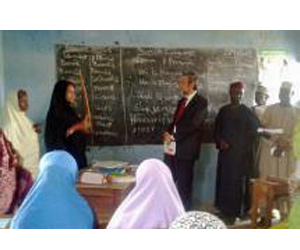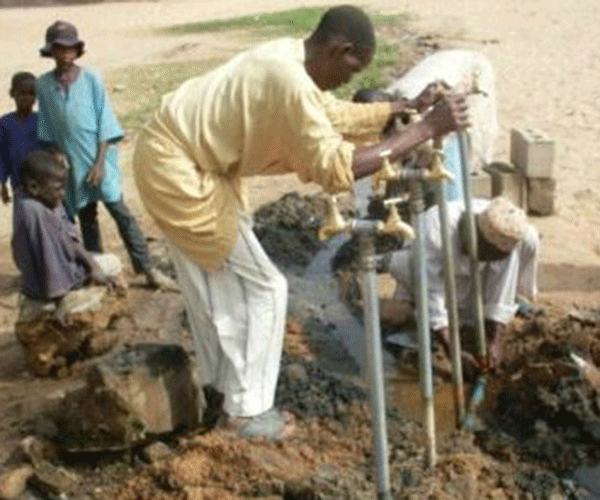After dropping out of elementary school, Amina Jibrin turned to selling fried yams to support her family. She had done this for seven years when she learned about a free vocational training program for young women.
The Adolescent Girls Program (AGP), a component of the USAID-funded Nigeria Northern Education Initiative (NEI), a USAID-funded project led by Creative Associates International, Inc. and supported by the Johns Hopkins Bloomberg School of Public Health Center for Communication Programs (JHU∙CCP) among other partners, seeks to help girls like Amina gain basic education. AGP is implemented by JHU∙CCP in 20 local government areas in the northern Nigerian states of Bauchi and Sokoto.
Through AGP, vulnerable adolescent girls who have dropped out of school acquire numeracy, literacy, vocational and life skills. Each AGP center enrolls between 35-50 girls ages 13-17 years. Upon completion of the nine-month program, NEI provides graduates with vocational equipment so that they can support their families.
Amina applied to AGP and joined 49 girls in the program. There, she not only learned the vocational skills she needed to ensure a better future, but also learned about stress management, oral health, water safety, nutrition and other health areas.
Upon graduation, the Dass Community Coalition in Bauchi state where Amina lives, provided several machines to support the graduating girls in their efforts to generate income. A top student in knitting, Amina received a knitting machine enabling her to open a shop in her home. She is now known in her neighborhood for knitting women’s, children’s and men’s sweaters.
“The money helps me to keep my younger siblings in school and assist my mother,” she says, expressing her dream of watching her seven siblings complete their education.
Not only does Amina help her family, but by taking on three adolescent girls as her apprentices, she is also giving back to her community by offering economic opportunities to other vulnerable girls.
Amina is just one of the many young women whose lives have been transformed by NEI. Nearly 1,000 participants have graduated from AGP since it started in 2010, and NEI has touched many other lives through the project’s initiatives, including its hand washing initiative, which sought to teach children about the importance of hand washing and built clean wells at 24 schools, and its Information Booklet for Adolescent Girls, which touches on topics such as peer-pressure, hygiene and staying in school.
“We are delighted to contribute [to] improving the wellbeing of children in the Dass local government area,” explains Malam Zakari Bala Yalwa, Chairman of the Dass Community Coalition. “NEI is helping us to advocate and mobilize resources for the good of our people.”
NEI is USAID/Nigeria’s four year flagship education project in Bauchi and Sokoto states and is implemented by a consortium of Nigerian and international partners and the Government of Nigeria in the two northern states of Bauchi and Sokoto. NEI focuses on state level system strengthening to deliver basic education services, teacher education and support for OVC to access basic education.



